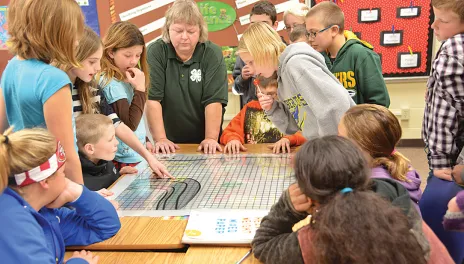The Science of Youth Development Fuels 4-H Programs
The work of NDSU Extension specialists, agents and adult volunteers in North Dakota’s 4-H programs is driven by science-based practices for helping youth achieve positive developmental outcomes.
Research has shown that youth who participate in 4-H are more likely than their peers to make healthy choices, be civically engaged and contribute to their communities. Meagan Hoffman, 4-H youth development specialist, explains that those positive outcomes stem from the strong developmental context 4-H programs provide.
“Providing a nurturing environment that supports youth development is key to helping youth thrive and develop the skills necessary for them to achieve desired outcomes in adolescence and beyond,” says Hoffman. “This happens primarily by providing high quality programs with a focus on youth belonging.”
Caroline Homan, NDSU doctoral graduate assistant for the Center for 4-H Youth Development, describes how the science of learning and development is built into the fiber of 4-H.
“Research shows that in order for humans to thrive, we need strong relationships, and youth learn best through relationships with supportive adults,” says Homan. “We train our Extension agents and adult volunteers on the factors science says are needed for positive youth outcomes.”
Engagement is another piece of the development equation. By engaging youth through hands-on, project-based learning, 4-H helps youth tap into their passion and learn how to contribute to their families, schools and communities.
“When young people can find their spark — the thing that gives them hopeful purpose — they are less likely to engage in risky behavior, experience mental health struggles or have suicidal ideation,” adds Homan. “Through 4-H we can help ignite that spark and get youth excited about their futures.”
With research at its foundation, 4-H provides the context in which youth can develop the skills they need to develop personal responsibility, succeed in academics, enter the workforce, engage in their communities and possibly start healthy families of their own.
FOR MORE INFORMATION:
North Dakota 4-H Youth Development
Meagan Hoffman, 701-231-7964, meagan.scott@ndsu.edu

